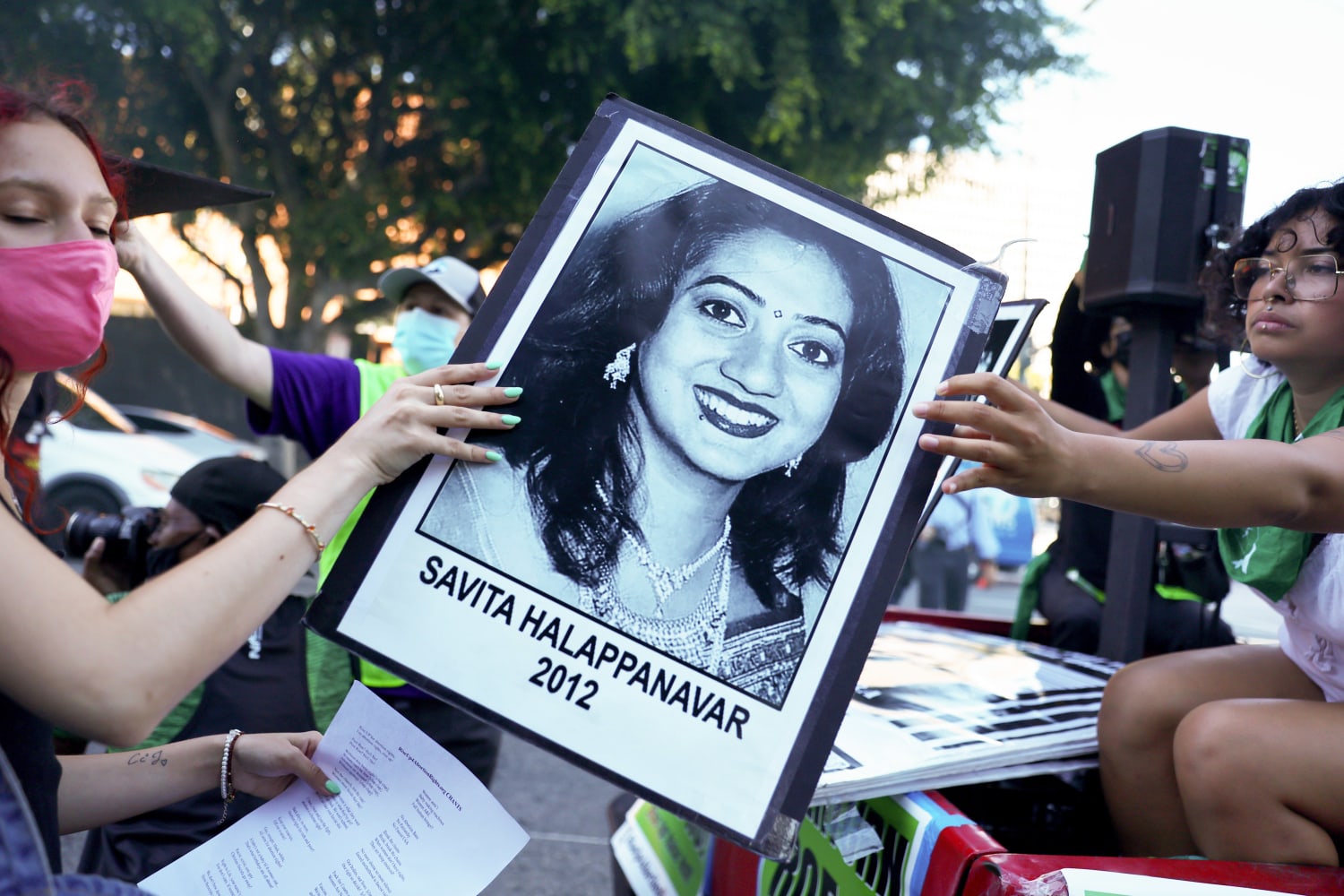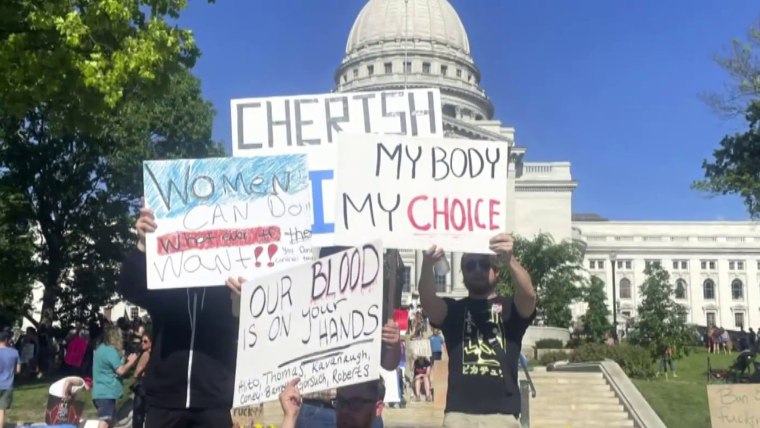Praveen Halappanavar, who didn’t respond to a request for comment, told The Guardian newspaper in 2013 that the inquest into his wife’s death “vindicated” his version of events. He told the inquest that a doctor told him an abortion couldn’t be performed because “this is a Catholic country.
After the report was released University Hospital Galway apologized to Halappanavar’s family in a statement which said it “was clear” that “there were failures in the standards of care provided.”
“We can reassure all concerned that we have already implemented changes to avoid the repeat of such an event,” it added.
Threat to a mother’s life
While some American states have enacted “trigger laws” banning abortion — some offering exceptions such as in the case of rape or incest, and all currently allow abortion if the mother’s life is seriously at risk — many experts question how easy it will be to get such an exception. In addition, asking doctors to interpret complex legislation in the middle of a medical emergency can lead to dangerous decisions, they said.
Irish law in 2012 allowed abortion to prevent a “potential major hazard or threat to the mother’s life.” But the Halappanavar report said a doctor decided the point at which an abortion was “allowable in Irish law” had not been reached.
This is not a theoretical scenario in the U.S., said Dr. Jen Gunter, an OB-GYN based in California and the author of “The Vagina Bible.”
“I’ve personally been in a situation where due to the state law, abortion was illegal at our medical center and we had a patient who needed one,” she said in an interview, declining to share any further details of the case aside from the fact that it was in Kansas, where abortion is legal up to 22 weeks with some restrictions.
“It wasn’t a pregnancy complication, her organs were failing because of the extra burden of pregnancy due to her underlying condition,” she added.
The attorneys at the medical center in Kansas told Gunter she couldn’t perform the abortion unless the woman was in “imminent danger.”
“I was like, ‘What does that mean?’ And their interpretation was that she was going to die in the next three minutes,” she said. Gunter said the hospital attorneys set up a call with the state politician involved in the legislation, who told her, “Do what you think is best, doctor.”
“So I thought, ‘Then why do we have this law?’” she said.
An ectopic pregnancy — in which a fertilized egg implants and grows outside the uterus, often in a fallopian tube, and can endanger the life of the mother — could cause added confusion and untenable delays in treatment under the new laws, she said.
Gunter is unsparing in her prediction for what tighter abortion laws could mean in the U.S.
She said women could die despite better antibiotics to treat septic abortions
“Halappanavar? That won’t ever change things in the States when that happens here, and it will happen.”
Lawmaker Ivana Bacik, leader of the Irish Labour Party and a long-standing advocate of abortion rights, led a protest against the Supreme Court decision outside the American Embassy in Dublin on Monday “in solidarity for American women and girls.”
“Our experience here is that banning and criminalizing abortion puts women’s lives in danger. It’s very clear that’s the appalling reality now for American women,” she said.
“If you remove the right to abortion from women and girls, you endanger lives. The reality is that there will be life-threatening conditions in pregnancy that will threaten lives and health.”
Bacik said Halappanavar’s story was instrumental in turning public opinion toward a “yes” vote in 2018. As was the case of a brain-dead woman in Ireland whose life support machine was only turned off more than three weeks after she was declared clinically dead in 2014 following a protracted legal battle because she was 18 weeks pregnant.
In their submission to Ireland’s ongoing government review of abortion laws, a group of 20 women’s rights and heath care charities commissioned polling in March showing 67% of people across the island supported free access to abortion — mirroring the support for the “yes” vote in 2018.
Still, opponents to abortion rights in Ireland continue to fight. On Saturday, a Right to Life rally will take place in Dublin, where organizers are calling on sympathizers “to be a voice for the 6,500 babies being killed by abortion every year.”
Carol Nolan, an independent lawmaker representing the constituency of Laois–Offaly in the Irish midlands, opposed the law change in 2018 and argues that Halappanavar’s death has been “deliberately and continually” misrepresented by women’s rights campaigners.
“The factors that overwhelmingly contributed to Savita’s death were then, medical negligence and the mismanagement of maternal sepsis,” she said via email, adding that she believed the law prior to 2018 — known as the Eighth Amendment — was not a barrier to Halappanavar receiving proportionate and effective care.
“Following the removal of the constitutional amendment, we have seen an explosion in the numbers of abortions and the application of relentless political and nongovernmental pressure to further widen the parameters of the post-2018 law,” Nolan said.
There were 32 abortions in Ireland in 2018 and over 6,000 in each of the following two years, according to the latest figures available from the country’s government.
“This was entirely predictable,” Nolan added. “However, it has only served to vindicate my own view that the Eighth Amendment acted as a beacon of proportionality and sound law grounded in an authentic vision of human rights.”
The sometimes deadly intersection of law and medicine in the debate preoccupied those who support abortion rights, too.
Bacik, the Dublin lawmaker, cited the case of Andrea Prudente, an American woman who was denied an abortion after heavy bleeding in Malta on June 12. She was airlifted to Spain where she received treatment and the fetus was removed.
Multiple cases of women dying after being denied abortions have emerged from Poland, which has a near-total abortion ban. Last year, a 30-year-old woman known only as Izabela, who was 22 weeks pregnant, died of septic shock, her family said. Scans had shown multiple problems with the fetus but doctors refused to terminate while there was a fetal heartbeat, Reuters reported.
After fetal death, doctors could then legally operate. But Izabela’s heart stopped on the way to the operating theater to have a cesarean section.
At subsequent mass protests in Poland, flags were raised bearing the slogan: “Her heart was beating too.”
Source: | This article originally belongs to Nbcnews.com












